

Edward Snowden: 'Smartphones can be taken over' Swedish office staff offered implants to access facilities. Julian Assange on Google and his 'difficult situation' Battery power alone can be used to track Android phones. 23 February 2015Last updated at 07:41 ET By Zoe Kleinman Technology reporter, BBC News A phone uses more power the further away it is from a cell tower as it tries to connect.
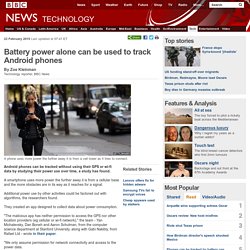
Android phones can be tracked without using their GPS or wi-fi data by studying their power use over time, a study has found. A smartphone uses more power the further away it is from a cellular base and the more obstacles are in its way as it reaches for a signal. Additional power use by other activities could be factored out with algorithms, the researchers found. They created an app designed to collect data about power consumption. "The malicious app has neither permission to access the GPS nor other location providers (eg cellular or wi-fi network)," the team - Yan Michalevsky, Dan Boneh and Aaron Schulman, from the computer science department at Stanford University, along with Gabi Nakibly, from Rafael Ltd - wrote in their paper. After You Die, There's a Debate About Your Data - Bloomberg Business.
Facebook on Thursday said it has finally decided how to handle the photos and friend requests of its deceased users.
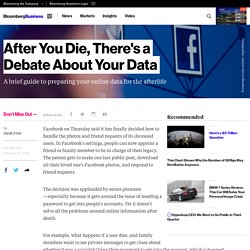
In Facebook's settings, people can now appoint a friend or family member to be in charge of their legacy. The person gets to make one last public post, download all their loved one's Facebook photos, and respond to friend requests. Sir Tim Berners-Lee explains why he pays for online services. John McAfee in surprise rant over Google and privacy. Find out who watches you online. BBC World News - Click, 26/07/2014 GMT, Protecting your wireless identity. Google removing BBC link was 'not a good judgement' 3 July 2014Last updated at 13:29 ET By Dave Lee Technology reporter, BBC News Links can be removed from search engines if they are deemed "irrelevant, outdated or no longer relevant"
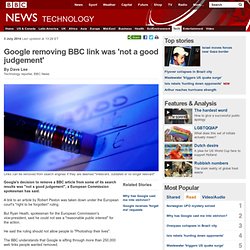
Politician and paedophile ask Google to 'be forgotten' 15 May 2014Last updated at 08:16 ET By Jane Wakefield Technology reporter The right-to-be-forgotten ruling set a precedent for the removal of search results in Europe Google has received fresh takedown requests after a European court ruled that an individual could force it to remove "irrelevant and outdated" search results, the BBC has learned.
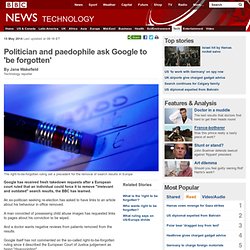
An ex-politician seeking re-election has asked to have links to an article about his behaviour in office removed. HTTP cookie. A HTTP cookie (also called web cookie, Internet cookie, browser cookie or simply cookie, the latter which is not to be confused with the literal definition), is a small piece of data sent from a website and stored in a user's web browser while the user is browsing that website.
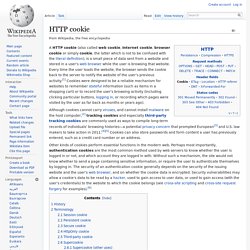
Every time the user loads the website, the browser sends the cookie back to the server to notify the website of the user's previous activity.[1] Cookies were designed to be a reliable mechanism for websites to remember stateful information (such as items in a shopping cart) or to record the user's browsing activity (including clicking particular buttons, logging in, or recording which pages were visited by the user as far back as months or years ago). §History[edit] The term "cookie" was derived from the term "magic cookie", which is a packet of data a program receives and sends back unchanged. How I divorced Google. March 16, 2012, 8:00 AM — I sat recently at the Grand Opening Ceremony at CeBIT 2012 in Hannover.
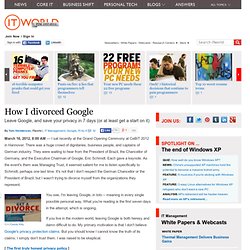
There was a huge crowd of dignitaries, business people, and captains of German industry. They were waiting to hear from the President of Brazil, the Chancellor of Germany, and the Executive Chairman of Google, Eric Schmidt. Each gave a keynote. As the event's them was Managing Trust, it seemed salient for me to listen specifically to Schmidt, perhaps one last time. Is it possible to quit Google? 9 July 2012Last updated at 20:42 ET By Kate Dailey BBC News Magazine.
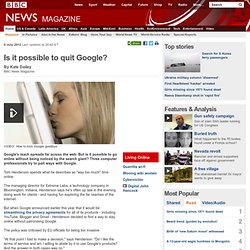
Google privacy changes 'in breach of EU law' 1 March 2012Last updated at 10:00 ET The new privacy policy is rolling out around the world on 1 March Changes made by Google to its privacy policy are in breach of European law, the EU's justice commissioner has said.
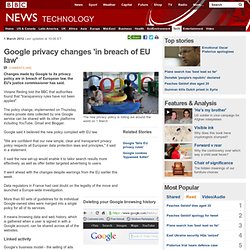
Viviane Reding told the BBC that authorities found that "transparency rules have not been applied". The policy change, implemented on Thursday, means private data collected by one Google service can be shared with its other platforms including YouTube, Gmail and Blogger. Google privacy row: Storm in a teacup? What is known about US spy programme Prism? What does Prism tell us about privacy protection? 10 June 2013Last updated at 07:16 ET By Zoe Kleinman Technology reporter, BBC News President Obama has defended US surveillance tactics, but whistleblower Ed Snowden said he was "horrified" by the activities Both international governments and the world's biggest tech companies are in crisis following the leaking of documents that suggest the US government was able to access detailed records of individual smartphone and internet activity, via a scheme called Prism.
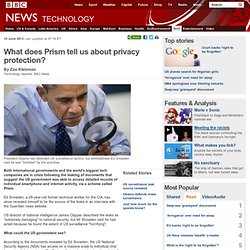
Ed Snowden, a 29-year-old former technical worker for the CIA, has since revealed himself to be the source of the leaks in an interview with the Guardian news website. US director of national intelligence James Clapper described the leaks as "extremely damaging" to national security, but Mr Snowden said he had acted because he found the extent of US surveillance "horrifying". Prism and privacy: What could they know about me?
12 June 2013Last updated at 11:08 ET By Tom de Castella and Kayte Rath BBC News Magazine Leaked documents have suggested the US government is able to access details of smartphone and internet activity under the Prism scheme.
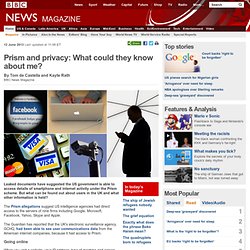
But what can be found out about users in the UK and what other information is held? The Prism allegations suggest US intelligence agencies had direct access to the servers of nine firms including Google, Microsoft, Facebook, Yahoo, Skype and Apple. The Guardian has reported that the UK's electronic surveillance agency, GCHQ, had been able to see user communications data from the American internet companies, because it had access to Prism. Going online When you visit a website, your IP address, type of machine and screen size can easily be ascertained. EU backs 'right to be forgotten' in Google privacy case. Facebook: The challenges ahead for the social network.
25 July 2012Last updated at 23:08 GMT Plenty to think about: Facebook boss Mark Zuckerberg has several key problems to solve, the experts say When Facebook first floated on the stock exchange earlier this year, it started out at an astronomical high, valued at over $100bn (£65bn). Since then, rockier times. From an initial share price of $38, Facebook's stock dipped to below $29 in May. This week, there comes another huge test for the site as it releases the financial results for its first quarter of public trading.